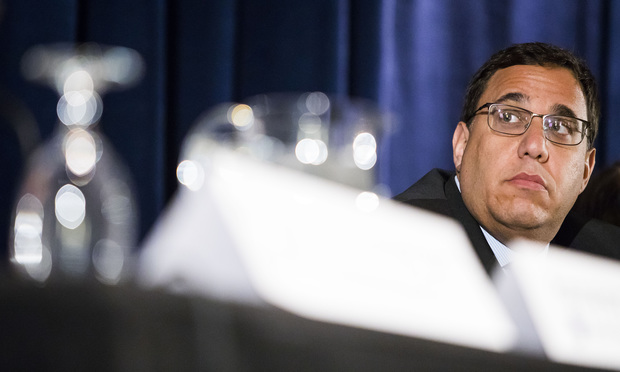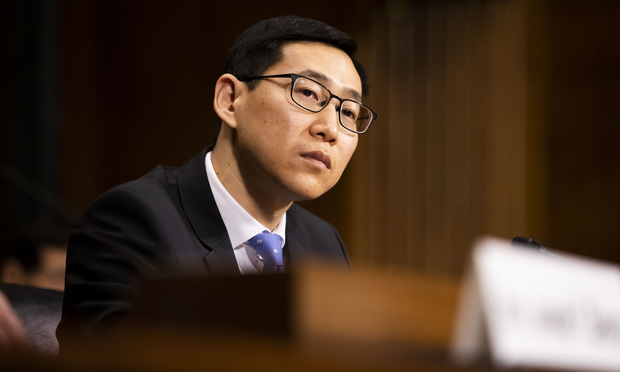'5-Hour Energy' Hires Trump Lawyer William Consovoy for Supreme Court Pitch
Consovoy McCarthy attorneys are now at the U.S. Supreme Court in a consumer protection case that confronts Washington state claims that 5-Hour Energy advertisements were deceptive.
February 04, 2020 at 12:44 PM
6 minute read
 William S. Consovoy, speaking in Washington in 2018. Credit: Diego M. Radzinschi / ALM
William S. Consovoy, speaking in Washington in 2018. Credit: Diego M. Radzinschi / ALM
William Consovoy's private legal work for President Donald Trump isn't a full-time job, as the veteran appellate lawyer presses other matters at the U.S. Supreme Court and elsewhere. Consovoy on Monday pitched the justices on a new case from Washington state for the maker of the 5-Hour Energy brand drink.
Living Essentials LLC, which brought on Consovoy McCarthy for the Supreme Court litigation, is challenging a state appeals court ruling that said the company is liable for allegedly making deceptive advertising claims. The Washington appeals court in March upheld a $2.2 million civil penalty against Michigan-based Living Essentials, which is also on the hook to pay Washington state more than $2 million in legal fees and costs.
The Washington appeals court ruling garnered widespread attention among regulatory and consumer practices at major U.S. law firms, and the Supreme Court litigation now tees up a fresh chance for the justices to review the contours of restrictions on commercial speech. Central to the dispute is the doctrine of "prior substantiation"—the idea that companies need to have some reasonable basis about a product claim before advertising it.
"This case presents an important question under the First Amendment about whether the government can punish commercial speech if the speaker lacks prior substantiation that its factual claims are true," Consovoy wrote in the petition at the Supreme Court. "The Washington Court of Appeals erred in holding the state may do so. The court should grant review."
A Washington state trial judge concluded that three advertising campaigns for 5-Hour Energy violated the Washington Consumer Protection Act. The advertisement campaigns in dispute were a "superior to coffee" claim; a claim that the decaf variety of the drink provided energy and alertness "for hours"; and an "ask your doctor" claim. The trial included hundreds of exhibits and testimony from nearly two dozen witnesses.
Living Essentials' claim that "5-Hour Energy works better than caffeine alone … is certainly plausible, given the science presented to the court, but it remains a hypothesis, not an established scientific fact," the trial judge concluded.
The Washington state attorney general's office, led by Robert Ferguson, represented the state in the appeal and will have a chance now to respond in the U.S. Supreme Court in the coming weeks to the Living Essentials petition.
In the lower court, Trisha McArdle, a senior counsel at the attorney general's office, and Daniel Davies, an assistant attorney general, called Living Essentials' advertisements a "national campaign of deception." The Washington attorney general's office said the trial judge "followed traditional, well-established and commonly understood consumer protection law."
Living Essentials was represented in the Washington state appeals court by lawyers from Stoel Rives in Portland, Oregon, and a team from Seattle's Carney Badley Spellman. The Consovoy McCarthy team includes Consovoy as counsel of record, partner J. Michael Connolly and Jordan Call, an associate.
"Banning unsubstantiated speech will have a distorting effect that the Constitution does not tolerate," Consovoy wrote in Monday's petition. "Commercial speakers are likely to alter the content of their speech—or, worse, avoid speaking entirely—in order to avoid risk of punishment."
The Trump Docket
Consovoy, who has argued two cases at the U.S. Supreme Court, is a founding partner of the firm. The former clerk to Justice Clarence Thomas left Wiley Rein in 2015 to launch the boutique. Public records show Consovoy bills at $950 hourly, but at times he will discount the rate for state clients, records show. Connolly, a partner at the firm, also bills at $950 hourly. A former Consovoy McCarthy name partner, Michael Park, reported earning income of $373,000 in 2017 and $577,000 in 2018 before his confirmation to the U.S. Court of Appeals for the Second Circuit.
 Michael Park testifies before the Senate Judiciary Committee. Credit: Diego M. Radzinschi / ALM
Michael Park testifies before the Senate Judiciary Committee. Credit: Diego M. Radzinschi / ALMIn recent months, Consovoy has been a regular face in trial and appellate courts for Trump, broadly arguing that the president's financial records, including his tax returns, must remain off-limits from congressional investigators. The firm is also representing Trump in various cases that allege Trump is profiting from the presidency by continuing to earn financial benefits from his vast business empire.
U.S. House Democrats, including general counsel Douglas Letter, contend Trump's lawyers at Consovoy McCarthy have gone too far in pressing arguments that would essentially mean the president is shielded from any meaningful oversight.
Trial and appellate judges in the District of Columbia and in New York have ruled against Trump in his crusade to keep his financial records secret. The U.S. Supreme Court on March 31 is set to hear a series of cases confronting the secrecy of Trump's financial records.
Consovoy's firm has continued to pick up legal work for private and state clients as the Trump cases move through the courts. Making pitches to state agencies to provide legal services, Consovoy has noted the firm's role as a leading advocate for Trump.
"Our lawyers are accustomed to taking on nation-shaping, high-stakes matters," the firm said in a pitch to Alaska for legal services there. "Presently, we are engaged by President Donald J. Trump in numerous actions in federal district and appellate courts nationwide."
Consovoy McCarthy has done legal work for, or is currently working for, states including Alaska, Maine, Georgia and Florida.
Read more:
What New Supreme Court Cases Reveal About Big Law Billing Rates
Big Law Billed Republicans Millions to Sue Obama. Against Trump, Firms Work for Free
Former Roberts Clerk Will Argue Against LGBT Workers in New SCOTUS Term
This content has been archived. It is available through our partners, LexisNexis® and Bloomberg Law.
To view this content, please continue to their sites.
Not a Lexis Subscriber?
Subscribe Now
Not a Bloomberg Law Subscriber?
Subscribe Now
NOT FOR REPRINT
© 2025 ALM Global, LLC, All Rights Reserved. Request academic re-use from www.copyright.com. All other uses, submit a request to [email protected]. For more information visit Asset & Logo Licensing.
You Might Like
View All
'Religious Discrimination'?: 4th Circuit Revives Challenge to Employer Vaccine Mandate
2 minute read
4th Circuit Revives Racial Harassment Lawsuit Against North Carolina School District
3 minute read

DOJ, 10 State AGs File Amended Antitrust Complaint Against RealPage and Big Landlords
4 minute readLaw Firms Mentioned
Trending Stories
- 1Report: US Attorney E. Martin Estrada to Resign From California's Central District
- 2Steve Bannon Ordered Into Court for Questioning Over New Counsel
- 3Newly-Elected Albany County DA Restructures Office Leadership
- 4Public Defenders and Allies Oppose Rollback of NY Discovery Statute
- 5The Gospel According to Paxton? AG Fights Religious Group Over Migrants
Who Got The Work
Michael G. Bongiorno, Andrew Scott Dulberg and Elizabeth E. Driscoll from Wilmer Cutler Pickering Hale and Dorr have stepped in to represent Symbotic Inc., an A.I.-enabled technology platform that focuses on increasing supply chain efficiency, and other defendants in a pending shareholder derivative lawsuit. The case, filed Oct. 2 in Massachusetts District Court by the Brown Law Firm on behalf of Stephen Austen, accuses certain officers and directors of misleading investors in regard to Symbotic's potential for margin growth by failing to disclose that the company was not equipped to timely deploy its systems or manage expenses through project delays. The case, assigned to U.S. District Judge Nathaniel M. Gorton, is 1:24-cv-12522, Austen v. Cohen et al.
Who Got The Work
Edmund Polubinski and Marie Killmond of Davis Polk & Wardwell have entered appearances for data platform software development company MongoDB and other defendants in a pending shareholder derivative lawsuit. The action, filed Oct. 7 in New York Southern District Court by the Brown Law Firm, accuses the company's directors and/or officers of falsely expressing confidence in the company’s restructuring of its sales incentive plan and downplaying the severity of decreases in its upfront commitments. The case is 1:24-cv-07594, Roy v. Ittycheria et al.
Who Got The Work
Amy O. Bruchs and Kurt F. Ellison of Michael Best & Friedrich have entered appearances for Epic Systems Corp. in a pending employment discrimination lawsuit. The suit was filed Sept. 7 in Wisconsin Western District Court by Levine Eisberner LLC and Siri & Glimstad on behalf of a project manager who claims that he was wrongfully terminated after applying for a religious exemption to the defendant's COVID-19 vaccine mandate. The case, assigned to U.S. Magistrate Judge Anita Marie Boor, is 3:24-cv-00630, Secker, Nathan v. Epic Systems Corporation.
Who Got The Work
David X. Sullivan, Thomas J. Finn and Gregory A. Hall from McCarter & English have entered appearances for Sunrun Installation Services in a pending civil rights lawsuit. The complaint was filed Sept. 4 in Connecticut District Court by attorney Robert M. Berke on behalf of former employee George Edward Steins, who was arrested and charged with employing an unregistered home improvement salesperson. The complaint alleges that had Sunrun informed the Connecticut Department of Consumer Protection that the plaintiff's employment had ended in 2017 and that he no longer held Sunrun's home improvement contractor license, he would not have been hit with charges, which were dismissed in May 2024. The case, assigned to U.S. District Judge Jeffrey A. Meyer, is 3:24-cv-01423, Steins v. Sunrun, Inc. et al.
Who Got The Work
Greenberg Traurig shareholder Joshua L. Raskin has entered an appearance for boohoo.com UK Ltd. in a pending patent infringement lawsuit. The suit, filed Sept. 3 in Texas Eastern District Court by Rozier Hardt McDonough on behalf of Alto Dynamics, asserts five patents related to an online shopping platform. The case, assigned to U.S. District Judge Rodney Gilstrap, is 2:24-cv-00719, Alto Dynamics, LLC v. boohoo.com UK Limited.
Featured Firms
Law Offices of Gary Martin Hays & Associates, P.C.
(470) 294-1674
Law Offices of Mark E. Salomone
(857) 444-6468
Smith & Hassler
(713) 739-1250










